Around the world, many Muslims celebrate the birth of the Islamic Prophet Muhammad (peace be upon him)* with feasts, festivals, street parades, chants and decorations in streets, mosques and homes.
Mawlid un-Nabi — also referred to as Eid Al-Mawlid Annabawi in certain Arabic dialects (eid means feast or celebration; mawlid means birth and un-Nabi means prophet) — is observed by Sunni Muslims on the 12th of Rabi’ Al-Awwal, the third month in the Islamic calendar, or on the 17th of the same month by Shiite Muslims. Because the Islamic calendar is lunar, the holiday shifts by about 10 days every year on the Gregorian calendar.
Prophet Muhammad (PBUH), the prophet of Islam, was born in A.D. 570 in Mecca, now Saudi Arabia. There are no mentions of celebrations of the Prophet’s birth during his lifetime; in fact, the first large-scale celebrations took place in 1207 in the city of Irbil, then known as Arabala and located in modern-day Iraq. These were led by the city’s Sufi missionaries, who spread the celebrations throughout Egypt during the Fatimid Dynasty. Later that century, the Mamluk Sultans in Egypt ornamented the celebrations by decorating the streets with lamps and silk cloths. Sufi groups and singers performed at Cairo’s Citadel and gifts were given to soldiers and the poor.
Today, Mawlid un-Nabi is an official holiday in Muslim countries, from its Middle Eastern origins to Africa to Malaysia, where the holiday is known as Maulidur Rasul. The celebrations in Egypt are still the largest in scale in the Middle East and Sufi Muslims continue to be the biggest devotees of this holiday. Some Muslim groups, such as Salafi and Wahabi, do not observe Mawlid un-Nabi. They believe that since the prophet didn’t celebrate his birthday during his life, they should follow suit.
During celebrations, food is distributed to the poor and people gather in mosques and streets to pray, recite the Qur’an (the Holy book for Muslims) and listen to poetry and songs that praise Prophet Muhammad (PBUH), his life, qualities, accomplishments and teachings. Many Muslims celebrate the day by fasting or abstaining from food or drinks from dawn until sunset.
Food is an important part of the celebrations. Desserts such as baklava, rice pudding or semolina porridge are eaten in countries all over the world. Honey is the sweetener of choice. Tharid, or tharida, a meat and vegetable broth served over crispy bread and thought to be Prophet Muhammad’s (PBUH) favorite dish, is often served. While it originated in the Arabian Peninsula, the type of meat, spices and vegetables can vary from one region to another, yielding a savory, spicy or sweet meal.
Other foods served during Mawlid un-Nabi vary among cultures, based on local traditions:
- Egypt: Hummus, sweets and pink colored candies shaped like knights on horses are common (horse candies also are shared in Sudan). Fried fritters called mshabbak made of wheat, sugar, butter and eggs are sometimes served.
- India and Pakistan: Muslims eat spicy rice and meat dishes, as well as sweet rice dishes. While camel meat is considered holiest for the occasion, goat and mutton are more common in this region.
- Kenya: Shrimp pilaf, curried eggplant, cassava with coconut sauce, mango chutney and roasted red pepper may be served as part of the celebrations.
- Lebanon and the Middle East: Here, people may feast on tabbouleh and roasted chicken stuffed with rice, spices and ground lamb (djaj mihshi). Dessert can be mshabbak or baklava.
- North Africa: Muslims enjoy aseeda (or asida), a dough-based dessert usually eaten warm by hand and made from cooked wheat flour, butter and honey.
- Malaysia: While celebrations and street parades can be massive in Malaysia, specific holiday food is not as emphasized. People often enjoy local street foods, and boxed meals may be distributed at the end of the parades.
*Whenever Muslims say or hear the name of the Islamic prophet, they follow it with a salutation known in Arabic as salawat. In English, the most common of these phrases is “Sallah Allahu Alaihi wa Sallam,” or “peace be upon him,” which some Muslims shorten to the abbreviation “PBUH.” In fact, Muslims send salutations after the name of any religious prophet, such as Moses or Abraham, by saying, “Alaihi Alsalatu wa Assalam.” For non-Muslims engaging with Muslim communities, using the phrase “peace be upon him” after an Islamic prophet’s name would be considered a gesture of respect, but it is understandable if it were omitted since it is not part of the culture of non-Muslims.
Find a Nutrition Expert
Looking for credible nutrition information and recommendations? The Academy of Nutrition and Dietetics' network of credentialed food and nutrition practitioners are ready to help!

